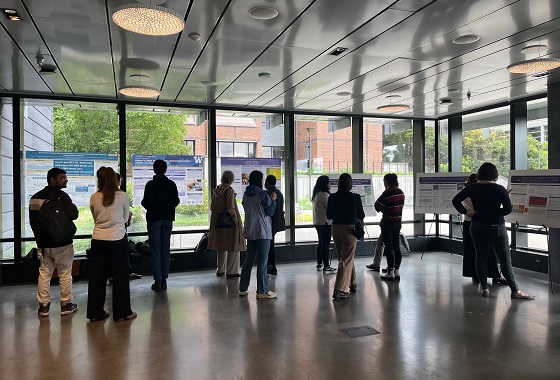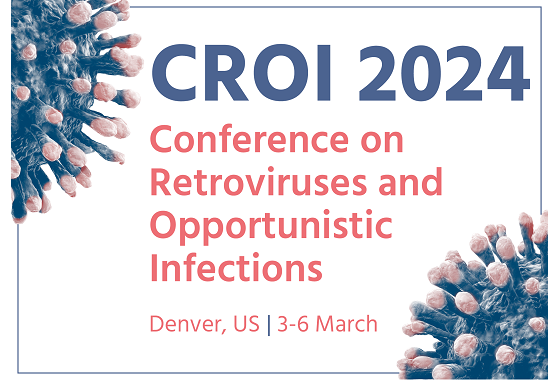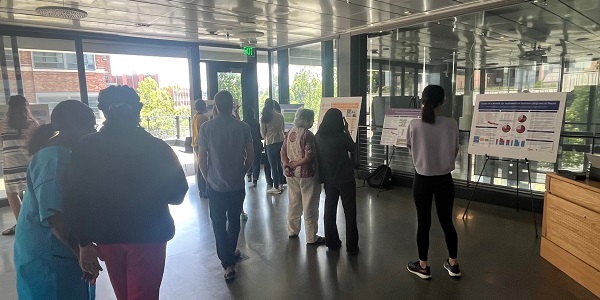students
June 5, 2024
2nd annual Global WACh Student Poster Symposium celebrates and highlights student achievements over the academic year
Categories: Certificate Program, Family Planning, Gut Health and Child Survival, HIV and Co-Infections, Research, students, Talks and Events

On May 28th in the Hans Rosling Center for Population Health, Global WACh hosted its second annual Student Poster Symposium featuring graduate student research aimed at improving the health and well-being of women, adolescents, and children. It was a celebratory end-of-year event to acknowledge students’ training, service, and achievement and give well wishes to those graduating UW.
This year’s symposium featured 14 posters by master’s and doctoral students and a postdoctoral fellow representing several departments and schools – Applied Bioengineering, Epidemiology, Global Health (General and Implementation Science tracks), Nursing, and Social Work. These included 90-hour capstone projects completed by students enrolled in the Global WACh Graduate Certificate Program, and master’s thesis and PhD dissertation-related posters by student supporting Global WACh’s research portfolio. Three posters were featured at scientific conferences over the academic year and shared with the UW global health community. (more…)
May 17, 2024
Two Global WACh Certificate students receive Department of Global Health travel fellowships
Categories: Certificate Program, students
First-year MPH in Global Health and Global WACh Graduate Certificate Program students, Edith Dale and Rara Deathicta Santoso Sudiro Dethan, are recipients of the 2024 Department of Global Health’s Funding for Fieldwork Fellowships. These coveted fellowships help support fieldwork experience for graduate students interested in gaining hands-on global health research experience abroad. Meet the students and read about their projects below.
(more…)
April 29, 2024
Researchers share pediatric and adolescent HIV and associated neurological research at CROI 2024
Categories: Conferences, HIV, HIV and Co-Infections, Research, students

See below for a list of poster abstracts to view. (more…)
August 29, 2023
Global WACh PhD trainees defend dissertations in Summer 2023
Categories: Gut Health and Child Survival, HIV and Co-Infections, students
This Summer Quarter, three doctoral students who have spent their PhD journeys with Global WACh, defended their dissertations leveraging research conducted in collaboration with partner institutions around the world. We are thankful for their contributions to advance our science and for the privilege to provide them with mentorship and training support. Congratulations to all! (more…)
July 6, 2023
SEEMS-Nutrition researchers share costing analyses of nutrition-sensitive programs at ANH Academy Week
Categories: Nutrition, Research, students
In June, researchers from the Strengthening Economic Evaluation for Multisectoral Strategies for Nutrition (SEEMS-Nutrition) project attended the 8th annual Agriculture, Nutrition & Health (ANH) Academy Week held online and in-person in Lilongwe, Malawi. The ANH Academy Week gathers a community of researchers, practitioners and policymakers working at the intersection of agriculture, food systems, nutrition, and health to foster knowledge exchange, innovation, and learning.
SEEMS-Nutrition Project Director, Dr. Carol Levin (Health Economist and Associate Professor, Global Health), and graduate student research assistants, Esther Choo and Aisha Twalibu, represented the University of Washington/Global WACh. They, along with colleagues from Helen Keller International (HKI) and International Food Policy Research Institute (IFPRI), shared two posters and one oral presentation from costing analyses and a synthesis of costs from ongoing nutrition interventions in Nepal (focusing on women and children’s nutrition) and Burkina Faso (focusing on increased poultry production to improve nutrition). (more…)
June 14, 2023
New study aims to identify barriers to implementing national sickle cell disease management guidelines in Kenya
Categories: Awards, Gut Health and Child Survival, Implementation Science, Research, students
Sickle cell disease (SCD) is a multi-system, life-threatening condition characterized by chronic anemia, frequent episodes of painful vaso-occlusive crises, organ infarction and eventually widespread organ damage. Over 80% of the 240,000 children born with SCD in sub-Sahara Africa each year die before their fifth birthday. Despite the existence of evidence-informed guidelines around the use of disease modifying interventions necessary for the management of SCD, guideline implementation in the region is suboptimal leading to preventable morbidity and mortality. (more…)
June 9, 2023
TeAMS Toolkit Pilot Study aims to improve nutrition guidelines adherence for pediatric care in Kenya
Categories: Gut Health and Child Survival, students
Since its launch in Spring 2022, the Team Approach to Malnutrition Services (TeAMS) Toolkit pilot study, funded by a UW Population Health Initiative grant, is progressing towards its goals to support healthcare workers in Kenya improve adherence to guidelines to care for pediatric patients with common illness that contribute to childhood mortality, such as malnutrition, pneumonia, diarrhea, and HIV. Although these guidelines have been available for decades, adherence to them remains suboptimal. Healthcare workers face common challenges including supply shortages, high workload burdens, and infrequent reinforcement. Existing strategies to improve quality of hospital care for children often require large investments in training and resources, making them difficult to implement at the facility level. Feasible implementation strategies to support healthcare workers and improve adherence to guidelines in routine care settings are urgently needed. (more…)
June 6, 2023
Global WACh Student Poster Symposium celebrates and highlights student achievements over the academic year
Categories: Certificate Program, Research, students

Members of the UW global health community gathered at the poster symposium in the Hans Rosling Center.
On June 1st, Global WACh hosted its first Student Poster Symposium to showcase scientific results by affiliated graduate student researchers and celebrate their achievements over the academic year. This hour-long event provided an opportunity for current students to share project summaries related to academic requirements (e.g. dissertation, capstone) or as Research Assistants supporting ongoing projects. Some posters were created for the event, while others were previously featured at other scientific conferences and could be accessible to the UW global health community. Faculty, staff, and students attended to view the posters and chat with the students to learn more about their contributions that help advance Global WACh’s science in collaboration with partner organizations. (more…)
June 5, 2023
Global WACh Certificate students receive DGH travel fellowships
Categories: Awards, Certificate Program, students
Three students from the Global WACh Graduate Certificate Program are recipients of the 2023 Department of Global Health’s Funding for Fieldwork Fellowships. These coveted fellowships help support fieldwork experience for graduate students in global health. Meet the selected students, who are earning their MPH degrees, and read about their projects below.
June 1, 2023
Global WACh PhD trainees defend dissertations
Categories: Research, students
This Spring Quarter, three doctoral students who have spent their PhD journeys with Global WACh, defended their dissertations leveraging research conducted in collaboration with partner institutions in Kenya. We are thankful for their contributions to advance our science and for the privilege to provide them with mentorship and training support. Congratulations to all! (more…)
Next page